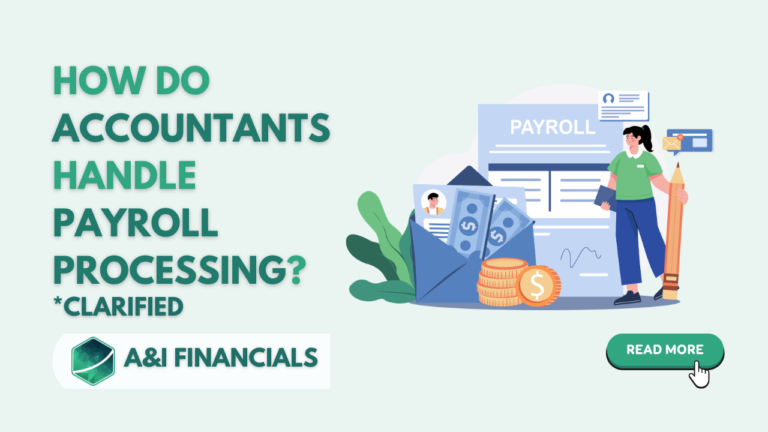10 Ways How Accountants Support Business Scalability-Case Study Included
When a business starts to grow, the challenges of managing finances increase. How do accountants support business scalability? The answer lies in their ability to manage financial complexities while enabling a company to scale efficiently and effectively. They play a crucial role in ensuring that as your business grows, it does so on a solid financial foundation.
The Role of Accountants in Business Scalability
Scaling a business isn’t just about growing bigger; it’s about doing so sustainably and efficiently. This is where accountants step in. They don’t just keep the books; they’re strategic partners who help businesses navigate the complex terrain of financial management. From ensuring cash flow to optimizing the use of accounting software, accountants provide the expertise needed to support every aspect of a growing business.
- Ensuring Financial Stability
One of the primary ways accountants support business scalability is by ensuring financial stability. Imagine trying to build a skyscraper on shaky ground—it wouldn’t stand for long. The same applies to businesses. If your financial foundation is weak, scaling your business becomes risky.
Accountants help by managing your cash flow, making sure you have enough liquidity to cover day-to-day operations. They analyze your financial statements, identify trends, and provide insights into where your business is heading. By doing so, they help you avoid potential financial pitfalls that could derail your growth plans.
- Optimizing the Accounting Process
As your business grows, so does the complexity of your accounting needs. Manual processes that once worked for a small business can become cumbersome and error-prone at scale. Accountants help by optimizing your accounting process, ensuring that it scales with your business.
They introduce efficient accounting software that automates routine tasks, saving time and effort.It’s not just about saving a few hours each week; it’s about freeing up time and resources to focus on important growth strategies. With cloud-based solutions, accountants ensure you have real-time access to your financial data, allowing for quicker, more informed decision-making.
- Strategic Financial Planning
Scaling a business requires more than just day-to-day financial management; it demands strategic planning. Accountants play a vital role in this by providing the financial foresight needed to support long-term growth.
They work with you to develop budgets and forecasts, aligning them with your business goals. They help you understand the financial implications of scaling, whether that means hiring new staff, expanding to new markets, or investing in new technologies. Having a strong financial plan allows you to grow your business confidently, knowing your finances are secure.
- Managing Taxation and Compliance
As your business scales, so does your tax liability. The more complex your operations, the more complicated your tax situation becomes. Accountants are essential in managing taxation and compliance, ensuring that your business meets all legal obligations while minimizing tax liabilities.
They stay up-to-date with the latest tax laws and regulations, providing advice on how to structure your business for tax efficiency. Whether it’s taking advantage of tax credits, deductions, or planning for future tax obligations, accountants help you navigate the complexities of the tax system, allowing you to focus on growing your business.
- Enhancing Service Delivery
For service-based businesses, scaling often means expanding service offerings or improving service delivery. Accountants support this by ensuring that the financial infrastructure is in place to support these changes.
They help you understand the costs associated with scaling your service delivery, whether it’s hiring more staff, investing in new technology, or expanding to new locations. By providing a clear picture of your financial situation, accountants enable you to make informed decisions that enhance your service delivery without jeopardizing your financial stability.
- Leveraging Technology for Growth
In today’s digital age, technology plays a critical role in scaling a business. Accountants are at the forefront of this, helping businesses leverage technology to streamline operations and support growth.
They introduce cloud-based accounting solutions that provide real-time insights into your financial health. These tools not only handle routine tasks automatically but also offer useful data to guide strategic decisions. By leveraging technology, accountants help businesses stay competitive, reduce costs, and scale more efficiently.
- Supporting Business Growth with Financial Insights
Accountants don’t just crunch numbers; they provide valuable insights that support business growth. They analyze financial data to spot trends, opportunities, and hidden risks that aren’t immediately obvious.
For example, they can help you understand your profit margins, identify your most profitable products or services, and pinpoint areas where you can cut costs. These insights are crucial for scaling your business, as they provide the information needed to make data-driven decisions that drive growth.
- Building a Strong Accounting Team
As your business scales, you’ll likely need to expand your accounting team. Accountants are crucial in helping you create a team that supports your growth.
They assist in recruiting and training new staff, ensuring that your accounting function can handle the increased workload that comes with scaling. They make sure your team has the latest tools and technologies, enabling them to work more efficiently and effectively.
- Managing Risks During Scaling
Scaling a business comes with its fair share of risks. Whether it’s financial, operational, or market-related, these risks can pose significant challenges if not managed properly. Accountants are instrumental in identifying and mitigating these risks, ensuring that your business scales safely and sustainably.
They conduct financial audits, review your internal controls, and assess your financial position to identify potential risks. They help you create risk management strategies to ensure your business is ready to face any challenges during growth.
- Providing a Competitive Advantage
In a crowded market, having a competitive advantage is crucial for scaling your business. Accountants help you achieve this by providing financial insights that give you an edge over your competitors.
They assist you in understanding your cost structure, finding ways to cut costs, and increasing your profit margins. They also provide insights into pricing strategies, helping you stay competitive while maximizing your revenue. A clear understanding of your financial situation allows you to make strategic decisions that give you an edge over the competition.
The Practical Benefits of Accountants in Scaling Your Business
The benefits of having accountants support your business scalability are numerous and practical. Let’s break down a few key advantages:
- Time and Effort Savings
By automating routine financial tasks and optimizing your accounting process, accountants save you time and effort. This allows you to focus on what matters most—growing your business.
- Better Decision-Making
With real-time access to your financial data and the insights provided by your accountant, you can make more informed decisions. This leads to better outcomes and more effective scaling strategies.
- Improved Financial Stability
Accountants ensure that your financial foundation is strong, reducing the risk of financial instability as your business grows. This allows you to scale with confidence, knowing that your finances are in good hands.
- Enhanced Competitive Advantage
The financial insights from accountants help you create strategies that give you a competitive advantage. Whether it’s reducing costs, improving profit margins, or optimizing your pricing, these insights are invaluable for staying ahead of the competition.
- Long-Term Success
Ultimately, the support provided by accountants leads to long-term success. By managing your finances effectively, providing strategic insights, and ensuring compliance, they help you scale your business in a sustainable way.
How to Choose the Right Accountant for Scaling Your Business
Choosing the right accountant is crucial for successfully scaling your business. Here are a few tips to help you make the right choice:
- Look for Experience
Experience is key when scaling a business. Find an accountant with a proven history of successfully helping businesses grow. Request references and case studies to verify their expertise.
- Consider Their Service Offerings
Different accountants offer different services. Ensure the accountant you select provides the services necessary to support your business growth. Whether it’s financial planning, tax management, or technology integration, choose an accountant who can provide comprehensive support.
- Evaluate Their Use of Technology
In today’s digital age, technology plays a critical role in accounting. Look for an accountant who leverages the latest accounting software and tools to provide real-time insights and automate routine tasks. This will ensure that your accounting process is efficient and scalable.
- Assess Their Communication Skills
Scaling a business requires clear communication. Choose an accountant who communicates effectively, provides regular updates, and is responsive to your needs. This will ensure that you’re always informed and can make decisions quickly.
- Check Their Industry Knowledge
Different industries have different financial needs. Choose an accountant who has experience in your industry and understands the unique challenges and opportunities you face. This guarantees you get advice that’s specifically relevant to your business.
Case Study: How Accountants Can Support Business Scalability
When a small tech startup decided to expand its operations, they faced several challenges in managing their growing finances. They realized that without a solid financial plan, scaling up could lead to cash flow issues, tax problems, and inefficiencies. To overcome these challenges, they brought an experienced accountant on board.
The accountant began by organizing the company’s financial records and setting up a reliable accounting system. This system provided real-time insights into their financial health, helping the business owners make informed decisions quickly. The accountant also introduced cloud-based accounting software, which automated routine tasks like invoicing and expense tracking, saving time and reducing errors.
Next, the accountant worked closely with the management team to develop a comprehensive financial plan. This plan included detailed budgets and forecasts, ensuring that the company could scale without facing unexpected financial hurdles. The accountant also helped the startup navigate complex tax regulations, ensuring compliance and finding opportunities for tax savings.
As the business grew, the accountant provided ongoing support, regularly reviewing financial data to identify trends and potential risks. This proactive approach allowed the startup to adjust its strategy as needed, avoiding potential pitfalls and seizing new opportunities.
In the end, the startup successfully scaled its operations, expanding into new markets without sacrificing financial stability. The accountant’s expertise was key to this success, providing the financial foundation needed for sustainable growth.
How Accountants of A&I Financials Support Business Scalability?
At A&I Financials, accountants help businesses scale by providing the right financial services for their specific needs. They focus on effective financial planning to prepare companies for growth. By using advanced accounting tools and cloud-based systems, A&I Financials makes financial processes easier and faster. This gives businesses real-time insights to make quick decisions. Their expertise in managing cash flow, tax strategies, and financial risks helps businesses expand confidently and sustainably. With A&I Financials, companies build a strong financial base for lasting growth and success.
Conclusion: Accountants—Your Partners in Scaling Success
So, how do accountants support business scalability? They do so by providing the financial expertise, insights, and tools needed to scale your business efficiently and sustainably. From ensuring financial stability to optimizing your accounting process, accountants are your partners in scaling success.
As your business grows, the challenges become more complex, and the stakes get higher. With the right accountant by your side, you can confidently tackle these challenges, knowing your finances are secure, risks are managed, and growth is sustainable. So, if you’re planning to scale your business, consider bringing an accountant on board. Their support could be the key to your success.






